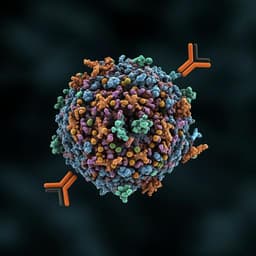
Medicine and Health
A potent neutralizing antibody provides protection against SARS-CoV-2 Omicron and Delta variants via nasal delivery
X. Zhang, H. Zhang, et al.
Discover a groundbreaking study that showcases the human antibody 586G, demonstrating robust neutralizing effects against the Delta and Omicron variants of SARS-CoV-2. Remarkably effective through nasal delivery, 586G not only prevents viral replication in lungs but does so with a low daily dose, making it a strong candidate for future COVID-19 treatments. This innovative research was conducted by Xinghai Zhang, Huajun Zhang, Tingting Li, Shaohong Chen, Feiyang Luo, Junhui Zhou, Peiyi Zheng, Shuyi Song, Yan Wu, Tengchuan Jin, Ni Tang, Chengyong Yang, Guofeng Cheng, Ruil Gong, Sandra Chiu, and Ailong Huang.
Related Publications
Explore these studies to deepen your understanding of the subject.







